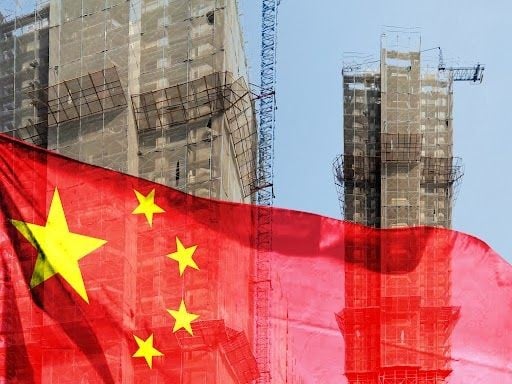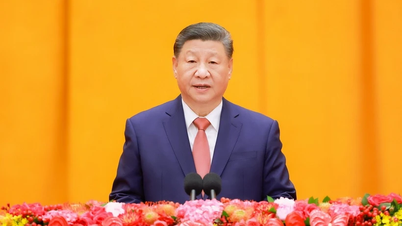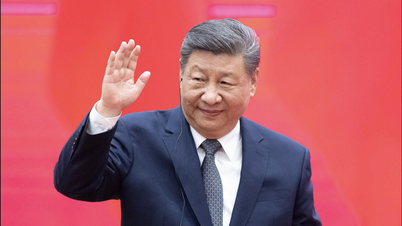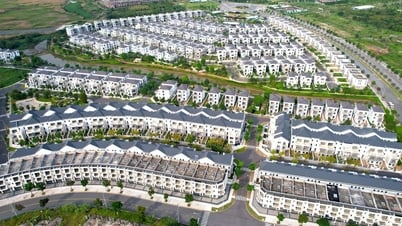 |
| China's economy has been weighed down by a property market crisis, record youth unemployment and a global recession. (Source: Shutterstock) |
China's National Bureau of Statistics (NBS) said on January 17 that the world 's second-largest economy's gross domestic product (GDP) grew 5.2% in the fourth quarter of 2023, compared to the same period last year.
Good fundamentals
Measures including “tightening macro management, strengthening domestic demand expansion, optimizing structures, restoring confidence, and preventing and mitigating risks” have helped improve the country’s recovery momentum, supply and demand, the NBS said.
Industrial output, which measures activity in China’s manufacturing, mining and utilities sectors, rose 4.6% in 2023 from a year earlier. Meanwhile, retail sales of consumer goods rose more strongly, rising 7.2%.
Fixed-asset investment — which includes spending on factory equipment, construction and other infrastructure projects aimed at boosting growth — also rose 3% year-on-year in 2023.
In addition, exports - a key growth driver - fell last year for the first time since 2016. Geopolitical tensions with the US and efforts by some Western countries to reduce their dependence on China or diversify their supply chains also weighed on growth.
The world's second-largest economy is expected to grow just 3% in 2022 due to Covid-19 restrictions. After lifting the measures at the end of 2022, Beijing is targeting growth of around 5% for the year.
After an initial recovery from the pandemic, the economy has been weighed down by a housing market crisis as well as record youth unemployment and a global recession.
“The national economy saw a recovery momentum, high growth rate was maintained, and major targets as planned were all achieved well,” NBS Commissioner Kang Yi said at a press conference.
Beijing is now looking to attract international investors.
Speaking at the 54th Annual Meeting of the World Economic Forum (WEF Davos 2024) in Davos, Switzerland, Chinese Premier Li Qiang said the country had achieved its economic goals without resorting to “massive stimulus” measures.
Just as a healthy person usually has a strong immune system, the Chinese economy can handle ups and downs in its performance, the overall long-term growth trend will not change, according to the Chinese premier.
The world's second-largest economy has “good and solid fundamentals for long-term development” and that Beijing will “adhere to the basic national policy of opening up to the outside world,” he said.
"The decision to invest in China is not a risk but an opportunity," the Chinese Prime Minister emphasized.
Demographic challenges
However, according to experts, this economy still has certain risks. Specifically, the problems hindering the real estate market have not been resolved. Meanwhile, this industry has long accounted for about a quarter of the growth of the Chinese economy and has had a dizzying increase in two decades.
But financial difficulties at major developers such as Evergrande and Country Garden have left projects unfinished, buyers running out of cash and home prices falling steadily.
Meanwhile, a lack of youth employment is also weighing on the economy. The country also faces longer-term questions about its growth potential amid record-low birth rates. The country reported a record-low birth rate in 2023.
Last year, the country recorded 6.39 births per 1,000 people, down from 6.77 a year earlier, the lowest birth rate since 1949, the NBS said. In addition, about 9.02 million babies were born, compared with 9.56 million in 2022. The total population will fall to 1.409 billion in 2023, down 2.08 million from the previous year.
The trend marks a deepening demographic challenge that has major implications for the world’s second-largest economy. A shrinking population will force Beijing to make structural changes to the economy and reshape sectors including health care and housing.
The slowing birth rate comes despite government efforts to encourage more couples to have children after decades of restrictive birth control policies.
“Fewer people are getting married and fewer couples want to have children,” said Yanzhong Huang, senior fellow for global health at the Council on Foreign Relations (CFR) in New York.
Strengthening the "silver economy"
Recently, the Chinese government has announced a number of measures to revive the weakening real estate sector and implemented many stimulus packages such as issuing 1 trillion yuan worth of government bonds in the fourth quarter of 2023.
The funds are deployed with the aim of funding disaster recovery projects to support areas damaged by floods and earthquakes. .
With its aging population, the Chinese government issued a guideline on January 15 to strengthen the “silver economy.” The document outlines 26 measures to improve food services, health care, entertainment and culture for the elderly, and develop industrial clusters that produce products for this economy.
China will accelerate the development of nursing homes and optimize medical services for the elderly, including strengthening general geriatric departments and traditional Chinese medicine hospitals, according to the guidelines. The document calls on banks to increase support for the construction of nursing homes and projects related to the “silver economy.”
In addition, local governments are allowed to issue special bonds to develop the “silver economy”.
In 2024, major international investment banks predict that the world's second-largest economy will grow at a slower pace than in 2023.
“A key task in 2024 is to manage the downside risks of the economy, especially from the housing market adjustment and spillover risks,” said Haibin Zhu, chief China economist at JPMorgan.
Despite efforts to improve weaknesses, the International Monetary Fund (IMF) predicts that China's growth rate will slow down in 2024. This year, the country's economy will grow at 4.6%, "amid continued weakness in the real estate market and declining external demand".
Similarly, the World Bank (WB) also believes that China's growth will slow to 4.5% in 2024 due to weaker domestic demand and increased geopolitical tensions.
Source



![[Photo] Panorama of the Opening Ceremony of the 43rd Nhan Dan Newspaper National Table Tennis Championship](https://vphoto.vietnam.vn/thumb/1200x675/vietnam/resource/IMAGE/2025/5/19/5e22950340b941309280448198bcf1d9)
![[Photo] Close-up of Tang Long Bridge, Thu Duc City after repairing rutting](https://vphoto.vietnam.vn/thumb/1200x675/vietnam/resource/IMAGE/2025/5/19/086736d9d11f43198f5bd8d78df9bd41)

![[Photo] President Luong Cuong presents the 40-year Party membership badge to Chief of the Office of the President Le Khanh Hai](https://vphoto.vietnam.vn/thumb/1200x675/vietnam/resource/IMAGE/2025/5/19/a22bc55dd7bf4a2ab7e3958d32282c15)
![[Photo] General Secretary To Lam attends the conference to review 10 years of implementing Directive No. 05 of the Politburo and evaluate the results of implementing Regulation No. 09 of the Central Public Security Party Committee.](https://vphoto.vietnam.vn/thumb/1200x675/vietnam/resource/IMAGE/2025/5/19/2f44458c655a4403acd7929dbbfa5039)






























![[Photo] Prime Minister Pham Minh Chinh inspects the progress of the National Exhibition and Fair Center project](https://vphoto.vietnam.vn/thumb/1200x675/vietnam/resource/IMAGE/2025/5/19/35189ac8807140d897ad2b7d2583fbae)























































![[VIDEO] - Enhancing the value of Quang Nam OCOP products through trade connections](https://vphoto.vietnam.vn/thumb/402x226/vietnam/resource/IMAGE/2025/5/17/5be5b5fff1f14914986fad159097a677)



Comment (0)